Andrew Haigh talks All of Us Strangers casting fears, sex scenes and coming out stories
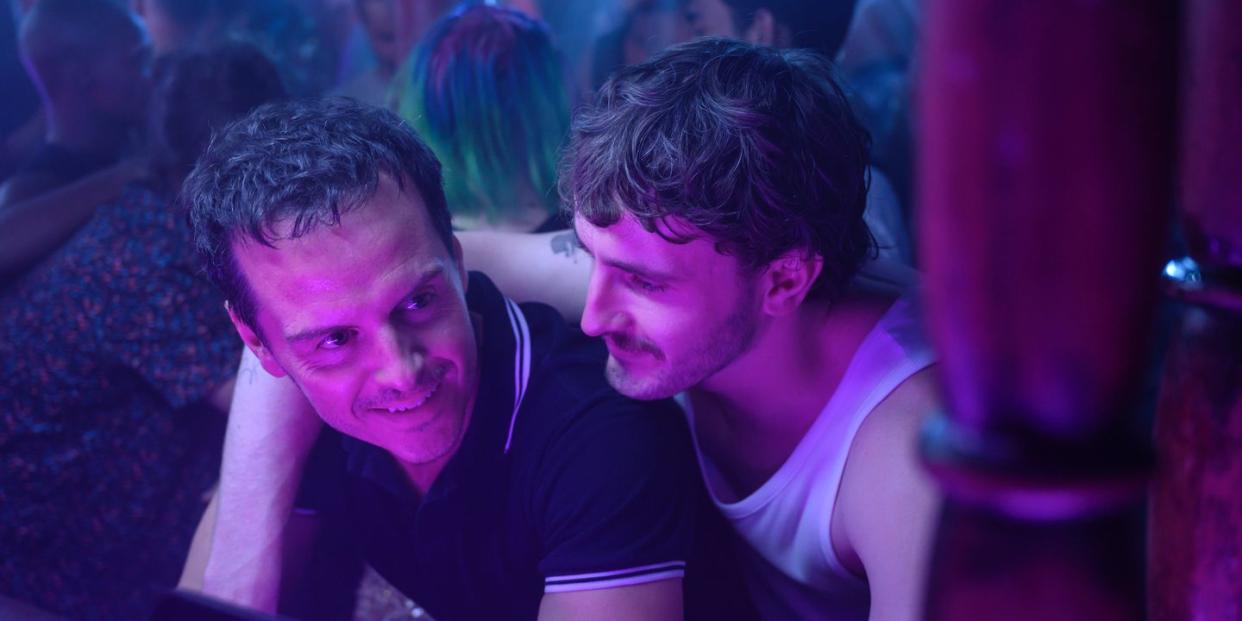
Rainbow Crew is an ongoing interview series that celebrates the best LGBTQ+ representation on screen. Each instalment showcases talent working on both sides of the camera, including queer creatives and allies to the community.
Next up, we're speaking to All of Us Strangers writer and director Andrew Haigh. Spoilers follow.
Time isn't a physical thing yet writer/director Andrew Haigh somehow weaves the mercurial essence of it into every single frame that makes up his fifth feature, All of Us Strangers (sixth if you count Looking: The Movie). In doing so, Haigh imbues the film with an ethereal quality that's just a step or two outside of our so-called objective reality.
But actually, that's what life can often be like as a queer person. In childhood, other kids often know you're different before you do, as if they've glimpsed your future first-hand, and for those who suppress their queerness growing up, it often takes years longer to come into your own.
Even then, once you've finally found some degree of healing, past traumas can pull you back in time just like that, transforming you once again into a younger, damaged version of yourself. (It doesn't help that coming out is a lifelong process, as if you're stuck in a not-so-funny '80s time-loop movie.)
In All of Us Strangers, a gay forty-something man named Adam is literally pulled back to these traumas when he meets his dead parents as they were, all those years ago before an accident took them away.
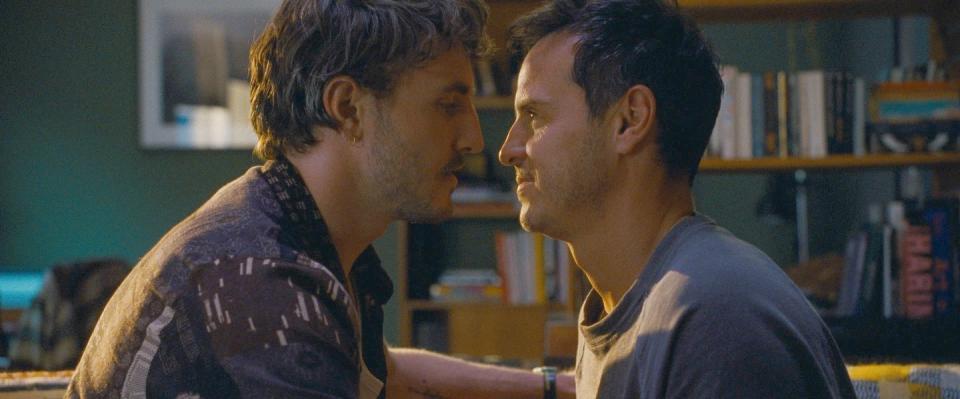
In coming out to these time-displaced figures – who both bring with them the baggage of AIDS-fuelled '80s hysteria – Andrew Scott's character almost becomes a child himself again, and in Haigh's real childhood home, no less.
Through adapting Taichi Yamada's novel Strangers (a book that's also a product of the '80s), Haigh bridges the gap between not just his past self and the present, but also two different eras of gay men through the intergenerational love story that unfolds between Adam and Harry (Paul Mescal), a younger man who accompanies him on this journey of healing.
Digital Spy caught up with Andrew Haigh to discuss coming-out scenes of a very different kind and the importance of crafting "a love letter to queer people of a certain generation". Along the way, we also talked the hidden significance of that sex scene and why casting Jamie Bell and Claire Foy was such a gamble.
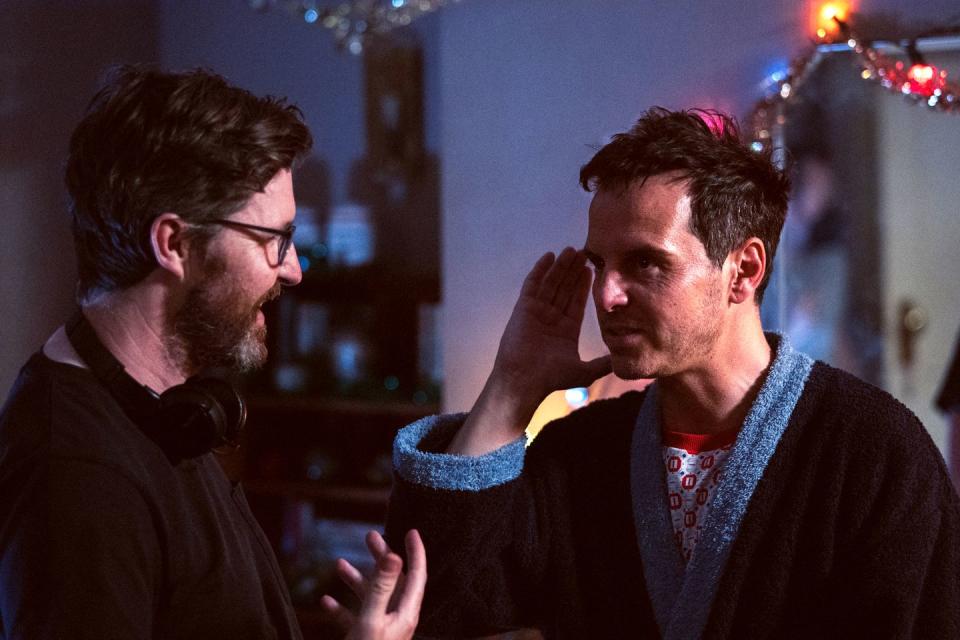
All of Us Strangers plays so much with time – like most of your work does – and that feels intrinsically queer to me. As queer people, we don't always follow a traditional timeline, so I wondered if you could share how the film's shifting of time relates to the queerness that's integral to this story?
It's so interesting, because I feel like as a queer person, time is somehow different. As you say, your life seems to go on a different trajectory, and you don't have the sort of markers that other people have, although that is changing. I do think for younger queer people, it is a slightly different experience.
So I think it's just inherent in me as a person that I see time slightly differently, which is why it's always so interesting for me to play around with the idea of time.
All of my films, whether it's been Weekend, which is an obsession with 48 hours of someone's life, or 45 Years where something from the past has come back and disrupted the present, it just... I'm just so interested in the nature of time.
Casting Jamie Bell and Claire Foy as Andrew Scott's parents, even though they're actually younger than him, is such an interesting idea to play around with, both visually and emotionally. But were you ever apprehensive or worried that this approach might fall short or not work in the way you hoped it would?
Yeah, I was really worried about it [laughs]. I thought if that doesn't work, the film is terrible. People might laugh at it and be like, "This is just so stupid". The film works on an emotional level and I need that to be believable and real.
But then, weirdly, the minute I started filming with them, my fears went away, because I could see that it was working in the moment. And I could see that it was working emotionally.
Jamie and Claire do an incredible job at feeling like they are Andrew's parents. And he does feel like he is their child. So the nature of how they look sort of becomes irrelevant. Then I thought a lot about how, of course, that makes sense.
If we think about our parents in our minds, we don't necessarily think about what they look like now, if they're still around. We think about how they used to be. It's the same with anybody in our lives. You can think of a friend that you may not have been in contact with for 20-30 years. In your mind, they're exactly like they were back then. I think that is just the nature of our memory and how that works, so it does make sense for the film.
That moment when Adam gets into bed with his parents could have been particularly hard to pull off, but it works so beautifully within the context of the narrative.
I mean it could be ridiculous. He's wearing pyjamas that don't fit, and he's trying to get into bed with his parents. It could be absolutely ridiculous. But I think it speaks to this idea... Think about those pyjamas.
We all understand the desire to want to go back and feel that comfort sometimes that we felt as a child, but of course, it doesn't fit anymore. They're too tight and he isn't a child. He is an adult. But within all of us, we still have that element of being a child within our adult bodies, not just as children but our parents are the same. Everybody is the same. The child is always trapped within us.
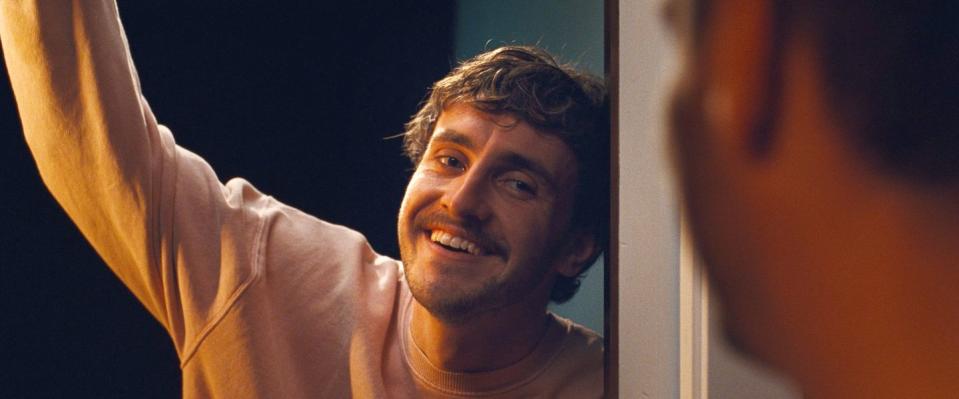
That element really comes to the fore in the film's two coming out scenes when Adam reveals himself to parents who are technically younger than him. We've seen so many coming out stories over the years, but we've never seen anything like this before. Why do you think these two scenes have resonated in particular with so many fans of the film?
I mean, there's a number of things. People are always like, "Oh, we don't need more coming-out scenes. We've done all the coming-out scenes," but I think a lot of us, as queer people and gay people, are still affected by that, that feeling of having to come out and how terrifying, how horrendous that was for so many of us and the fear of having to say something to our parents, and they may reject us for that.
It was a very, very traumatic event for lots and lots of people, especially back in the '80s.
What this is about, in many ways, it's not just that he's coming out to his parents, but he's being reminded of how he used to feel back then. Because the parents reaction is how everybody felt about gay people back in the '80s. Or how most people felt. That was a very difficult time.
I wanted it to be sort of generous as well, even to the parents, because they lived in a period of time where they were just fed stories and lies, essentially, and fears about gay people. So I didn't want to vilify the parents either because that's the culture they lived in at the time.
It's so rare still to see the experiences of gay men Adam's age explored like this. Why would you say it's important that the stories of gay men who lived through the AIDS crisis continued to be centred this way on screen?
I think it's a really important generation for me as a queer storyteller. I wanted to say something about that generation, and it is a very specific generation. It is a generation of people who grew up as AIDS was decimating communities.
As young queer people in that time, we grew up surrounded by the idea that our sexuality was completely linked to death. I think it's very easy to forget how traumatic and horrendous that was, and that we are still living with the ramifications of that and the shame that went along with that.
The way that people treated us made us feel ashamed. It's not that we were inherently shameful because we were gay, but we were made to feel shamed. That has been a struggle that a lot of us have had to work through into our 40s and 50s and people into their 60s are still dealing with that, so I think it's a really important thing.
And also just to remind people that yes the world has changed, thank God, and everyone seems to have forgotten what it was like back then, but we haven't forgotten, even on an unconscious level. We can remember.
I always wanted it to be a love letter to queer people of a certain generation to say, "You know what? I know that it's still painful to think back at that time, and it is still painful. And I want us to realise that it's still painful and it's okay to to appreciate that sometimes."
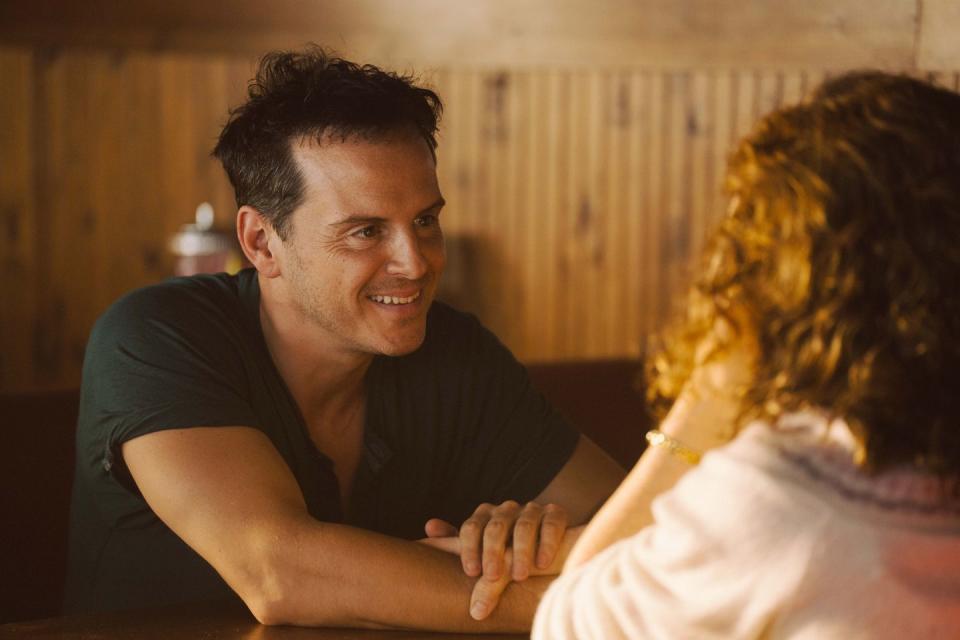
I was born in the mid '80s, so I wasn't an adult during the height of the AIDS crisis, but I absolutely felt the ramifications of it still into the '90s and beyond, this idea that being gay is instantly connected to fear and death.
Yeah, the '90s wasn't a Golden Age either. Even into the late '90s, I remember there were debates going on in the House of Commons where people would still be saying that what we were doing was sinful and wrong and that we were gonna go to hell.
This is in the '90s. This is not the 1970s or 1980s. So I think that living in the '80s and '90s was not an easy time for queer people, definitely.
That sex scene early on where Harry licks cum off Adam's chest really struck me, because any kind of contact with bodily fluids like this would have once been horrifying to Adam. Did you consciously include this scene in relation to Adam's shame and him overcoming it?
Absolutely. That's the point of that shot to me. I think there's probably lots and lots of people who will not truly understand that at all. Of course, you will understand it because you understand it from a personal standpoint.
There are two gay people of a different generation and one has no fear in that moment of what he's doing. The other one is still resistant to that. That's years of something within his body telling him to be resistant. And he overcomes it because of course, you can overcome it. Lots of people do overcome that fear and shame and that is the point.
In that moment, there was a little bit of resistance, but the intimacy and the compassion of Harry in that moment allows him to overcome a sort of embedded fear.
Some people see the ending as very uplifting and hopeful while others find it sad. Obviously, tragic endings are embedded in the history of queer cinema, so did you feel pressure to try and avoid tropes like 'Bury Your Gays'?
I understand there was that trope. It's often the trope actually gets said more than the reality of that being an actual reality. It's like "Oh, you're gonna kill off all the gays" but actually, that's not always what happens.
There is a way in which this film could have ended on a very optimistic, joyful note. To me, that would have been a little bit simplistic in terms of what the story is trying to unpick and understand, which is about the actual nature, the essence of love, and what is important within that.
I also think that sometimes when you're telling queer stories, I want to dig a little bit deeper into the pain, into the reality of things. There you can get closer to the truth and I think that is important.
Let's go back to the '80s. A lot of people, a lot of gay, queer people, lost their partners young and lost a lot of people that were very, very important to them. But as that also happened, what I found so profoundly beautiful is, it sort of highlighted the idea of love in itself as being some kind of saviour and that it can save you and the importance of that love. After all, loss is still so fundamentally important.
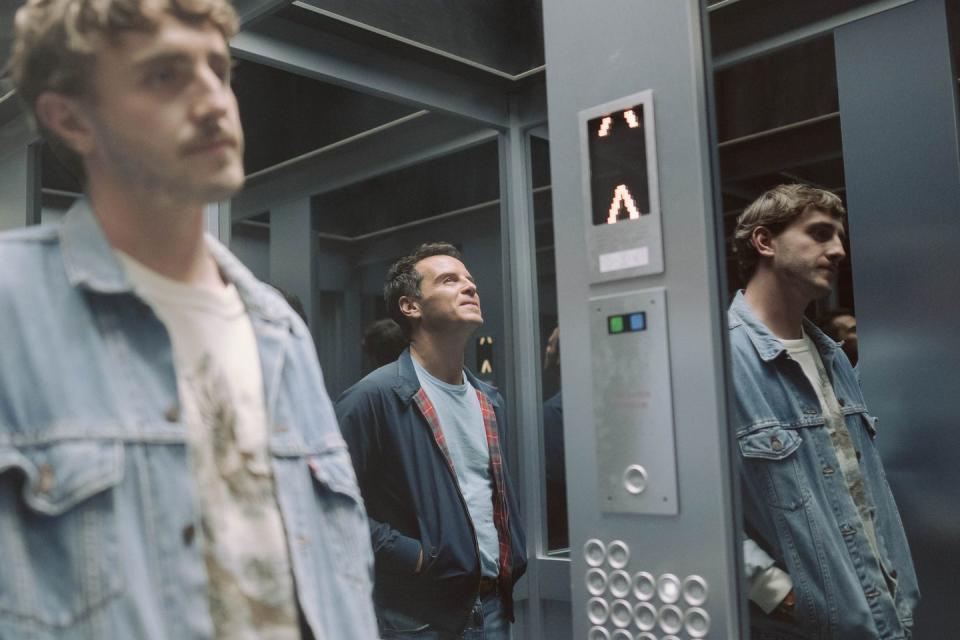
Looking back, is there a particular example of queer TV or film that really resonated with a younger version of yourself?
It's a tricky one. I feel like in the end, it was probably watching Beautiful Thing, that Hettie Macdonald film.
I remember I was working in a cinema, the National Film Theatre, and it was the gay and lesbian film festival, I think, or it was a special screening of Beautiful Thing. There is a gay film, actually, that's very, very joyous. It's got so much joy in it. It ends on a really uplifting, joyful note.
I just remember sitting at the back as an usher, seeing that film, and I wasn't even out at that point. I was still in the closet. And I remember feeling like, "Ah, okay, there's a possibility out there for me". I remember loving that moment. It was both emotional and cathartic and joyous.
I still love that film. I watch that film now when they're running through the woods and The Mamas and the Papas are playing and they kiss against the tree. It's so beautiful. I adore it. So even though my films don't often end on moments of pure joy, I still like moments of pure joy [laughs].
All of Us Strangers is out now in cinemas.
You Might Also Like


